Chris Baty's Blog, page 241
March 28, 2012
TV's Praise Problem
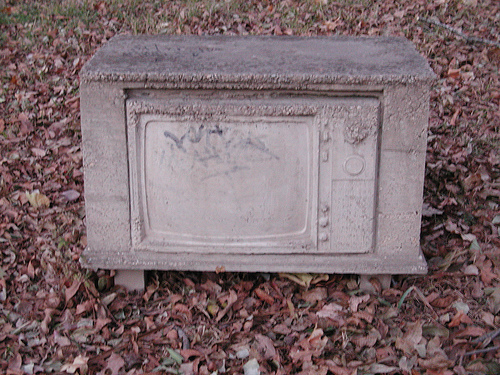
We're living in a wonderful age for television. Several current or recent shows deserve all-time-best consideration; audiences are knowledgeable and engaged; showrunners and writers are thinking in bigger arcs. I can barely manage my DVR.
But I'm troubled by a particular byproduct of all this wonderfulness: a phenomenon I call insta-aggrandizement. Strong shows with engaged viewers means that even before the credits end, folks are striking the first key in their rush to praise, analyze, and created animated GIFs. And with showrunners more available than ever before, they're helpful collaborators in this process, posting their own episode breakdowns, reactions, and responses to fans.[[MORE]]
I wish we could allow the TV set or laptop to cool down a bit before offering these appraisals. A prime example: Community is a fine show, and may very well stand the test of time. But it's terribly over-archived—by viewers and creators—before we even have a chance to understand its full scope and legacy. If Dan Harmon has already broken down every episode, what will be left for future audiences to think about and discover? And if Matthew Weiner puts in his own two cents on the Mad Men premiere, where's the room for us to have our own analysis?
I believe in television as a permanent, not a transitory, medium. I want to keep thinking about my favorite shows long after they're off the air. But if so much is juiced out as we quickly aggrandize them, I'm fearful that there will be few ideas left.
What do you think? Am I just a cranky Luddite who can't deal with the speed of social media? Do you like recapping and talking about your favorite shows right away? Why and how do you do it?
– Chris
Photo by Flickr user adamrice
March 27, 2012
What Script-Writers Can Learn from Improv (Part Two!)
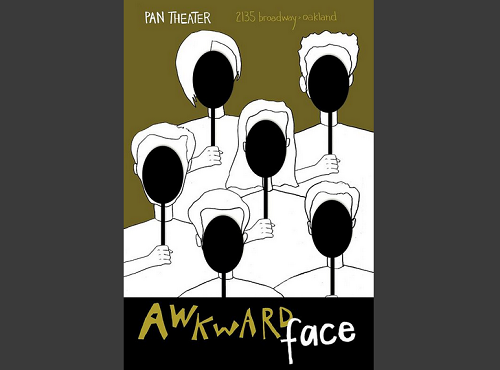
David Alger, of the Pan Theater in Oakland, returns to share more tips for beginners in improv, which are super applicable for script-writers, too! (A quick update on Operation: Liberate Laughter, Animal Control says the space we were going to repurpose for our first show isn't "safe", and that the raccoons there have "mutated", but you know what? I think what they meant is "isn't safe for HUMOR", and "mutated to develop FUNNY BONES". Whoo, the show is back on!)
Yesterday's tips are here.
5. Be Specific - Provide Details!
Details are the lifeblood of moving a scene forward. Each detail provides clues to what is important. Details help provide beat objectives and flesh out characters.
Example One: You're the best brain surgeon in all of West Valley, Mark. That's why I chose you to operate on mom.
Rather than:
You're the best doctor in this town, which is why I chose you.[[MORE]]
6. Change, Change, Change!
Improv is about character change. The characters in a scene must experience some type of change for the scene to be interesting.
Characters need to go on journeys, be altered by revelations, experience the ramifications of their choices and be moved by emotional moments.
We go to the theater to see the unusual days characters have, not the everyday moments of stasis and stagnation.
7. For serious and emotional scenes, focus on characters and relationships.
A long form improv set should contain a variety of scenes. Some scenes will be emotional, some will be tense, and some should be funny.
The easiest way to make a scene serious is by focusing on the relationship of the characters on the stage.
Other ways to make a scene dramatic is to hold a moment, use the silence, and focus on the shifting emotional points that emerge as a scene unfolds.
8. For humor, commit and take choices to the nth degree or focus on actions/objects.
A good long form set is balanced. Shakespeare knew that too much pathos was wearing on the audience; hence, he had minor characters in humorous scenes such as the drunken porter in Macbeth.
To create humor in improv, commit to choices to the nth degree or focus on actions and objects. Another way to create humor without doing so at the expense of the scene is to take every offer literally.
Try it on your own!
It is easier if you decide on a who, what and where first. The what is the idea of a scene such as a first date, winning money, or opportunity. The who is who the characters are - including names and their relationships, and the where is the location.
Try coming up with your own who, what and where, then write or say some dialogue out loud for both parts, or do it with a friend. Remember, anything said becomes a fact.
Have fun, use your imagination, improvise…
- David Alger, Producing Director at Pan Theater
Image courtesy of Pan Theater
March 26, 2012
What Script-Writers Can Learn from Improv
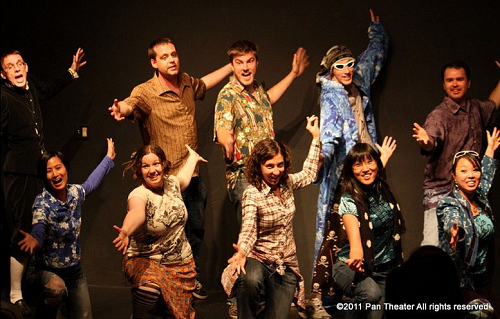
We recently spoke with David Alger, the producing director at Pan Theater in Oakland, in our ongoing efforts to pull together the OLL Comedy Troupe (tentatively known as Operation: Liberate Laughter. Staff has been generally unenthusiastic, and public interest is low, and the budget is nil, but none of that matters right now! Everything's going to be awesome!). He generously provided these tips for improv beginners, which we think are fantastically relevant for script-writing, too. Read on!
Improv is an art. However, it is also a craft. A craft is something that is learned throgh practice, repetition, trial, error and hard work. Much like any other art (including writing!), skill in improv is acquired over time. The more time spent improv-ing the greater the improvement (pun intended).
That being said, there are rules which can, in general, make a scene better.
As with any art form, you can break all of the rules and still have quality scenes. However, those best able to break the rules are those who first learn and understand them.
So, let's look at some of the basic rules of improv:[[MORE]]
1. Say "Yes, and!"
For a story to be built, whether it is short form or long form, the players have to agree to the basic situation and set-up.
The who, what, and where have to be developed for a scene to work.
By saying yes, we accept the reality created by our partners and begin the collaborative process from the start of a scene.
The collaborative process or group mind helps make us giants, animals, villains, or saints, and more importantly puts us in situations that we would normally avoid.
2. After the "'and," add new information.
An improvised scene can't move forward or advance unless we add new information. That is why new information is added after the "Yes" of "Yes, and!"
Example: Yes, I accept being your assistant Heir Doctor and will gladly get you the princess's body from the morgue tonight.
Rather than:
Yes, I accept being your assistant Heir Doctor. (SILENCE)
Saying "Yes, and" does not mean there won't be conflict or that we would accept something our character would not accept.
3. Focus on the Here and Now.
Another useful rule is to keep the focus on the here and now. A scene is about the people in the scene. The change, the struggle, the win or loss will happen to the characters on the stage.
Focus on what is going on right this at this moment.
Why is your partner moving away from you?
Why did she use a questioning tone?
What did the slight smile mean?
How do you, as your character, feel about what she is doing?
Remember, it isn't just about the words; it is about what is happening.
The words are tools used to accomplish or to pursue a goal (objective or need).
4. Establish the Location!
Good scenes take place somewhere and at sometime. They do not take place on an empty stage. A location can easily be established in one or two lines without breaking the scene.
Example One: My God, Bob you've put the tiger in with the bison again. The zoo manager will be so pissed at us.
Example Two: Hmm, so you're riding one of them auto-mobiles. Damn, well it is the 1890's. You New York City people, Markus, have all the modern things. Next you'll say you have electricity. I knew coming to New York would be exciting, my dear brother.
Each of the opening lines above provides an idea of a location. By working with your partner, the specifics of the location are further worked out. Of course, it is even better when you can establish location without words or with minimal use of dialogue.
David was bursting with so much wisdom that we split his advice into two parts. The last of his tips will be up tomorrow!
- David Alger, Producing Director at Pan Theater
Image courtesy of Pan Theater
March 23, 2012
On procrastination.
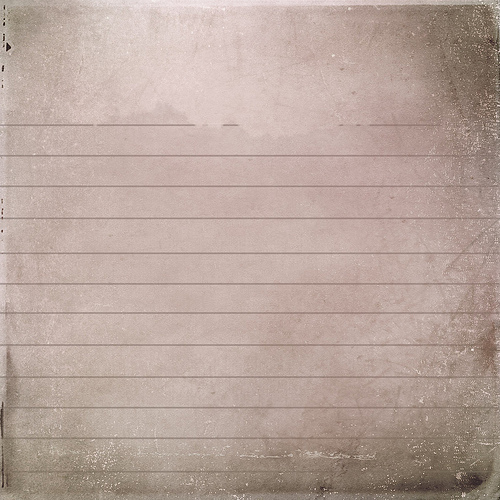
Just to be clear, I love writing. I love the surge of thoughts and joy that come from an hour or two of steady outlining or typing that (hopefully…) ends in creative success. What I don't love? Starting to write. It's funny how these things work out.
Over the past few weeks, I've been pondering my script, anxious to see where the plot twists and character decisions will take me. But does that mean I've started? Of course not. Instead of writing, I've been doing a variety of other things that are generally pointless. These things include, but are not limited to: exploring the Internet on StumbleUpon, watching old episodes of Modern Family, organizing my closet, painting my nails, and playing with orphaned Alaskan Huskies that I'm not allowed to adopt.
[[MORE]]All of these things would be extremely pleasurable if it were not for those looming feelings of guilt that come whenever I know I should be writing. And somehow those guilty feelings make it even more difficult to start.
Luckily, I have a plan. I've found that, when in a bind, if I hover over a blank piece of paper with my one of my lucky pencils (I always write in pencil), I eventually start writing. And once I eventually start writing, I eventually start to enjoy myself, and I realize again why I've chosen a writer's life.
And, if my highly non-scientific poll of other writer friends is any indication, I am not alone in this pool of procrastination and subsequent guilt-tripping. In fact, I'd say the only thing writers like to talk about more than their writing is procrastinating. I'm still not sure why it's such an easy trap to fall into, but I'm fairly certain I'm in good company.
How do you stomp out procrastination?
- Shelby
Photo by Flickr user jinterwas
March 22, 2012
Characters vs. Plot
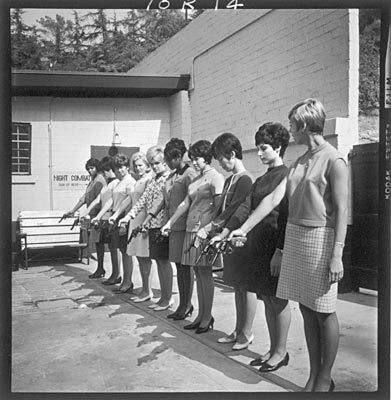
Next week is my spring break from school (hooray!) and I've resolved to use that week to solidify an outline for my screenplay. Although according to Script Frenzy rules I can't begin writing until April 1st, I probably should have begun my outline long ago. But even though I haven't settled on a story, I have a good idea of the types of characters that will populate my story, and that's a step in the right direction.
In the past few years I have become increasingly aware of the lack of well-developed female protagonists in movies, and as a young woman, I find this extremely frustrating. The assumption seems to be that while all audiences can relate to male heroes, only women can relate to female characters. But I can't help but wonder if it's because men actually feel alienated from women or if it's because female characters often lack the dimension and complexity given to male characters.[[MORE]]
So in my script I plan on doing away with flat female supporting characters by featuring an almost-all-female cast. And instead of perpetuating the Sex and the City stereotypes that women are catty, materialistic man-hunters, I want to explore the depth of female identity and sisterly camaraderie by developing female characters that are not primarily concerned with securing a man.
But while I've already developed some of the quirks and features of my main characters, I still need to come up with the story that's going to bring everything together. So I have my fingers crossed that next week will be as productive as it needs to be. April is just around the corner!
What comes first in your writing process, the plot or the characters? What are some of your all-time favorite female characters?
-Jessie
Photo by Flickr user scarletwrench
March 21, 2012
I'm Having Trouble Adapting

As has been previously established on this very blog, I have not been terribly successful at Script Frenzy in the past. I am hoping to break that streak this year. I figured what I needed was a strong outline, since that definitely works for me in the noveling realm, but I lack the lead time that I usually need to create one of my in-depth outlines.
The solution, it would seem, is obvious: adapt one of my existing novels into a screenplay. I've got ten to choose from, after all (actually, that's a lie—I'm fairly sure my first NaNoWriMo novel is lost to the ages, as it was written on an old computer that's no longer around, and I wasn't very organized about my digital files back then), and what's a better, more thorough outline than a near-complete novel? The only thing lacking is an ending; of all my novels, only one has what you could legitimately call an end. Still, that's fairly easily solved once I get to that point.
The next question, then, is which one to adapt. Do I choose the most complete story, which is also the most structured of my novels, but has a slightly confusing alternating point-of-view? The most cinematic story, with an easily-written logline and the most obvious mass appeal? Do I pick the one with the richest setting, to take advantage of the visual medium, or do I go for the one with the main character I like the best?[[MORE]]
So far, the only useful piece of information I've gleaned from flipping through past novels is that apparently, I'm the Star Trek movies of noveling: only my even-numbered novels are good. Help me out, readers. I wrote up some quick loglines for all the possibilities; which one should I write this April?
The 24 hours surrounding a wedding stir up old memories for the four people involved. (This is my 2005 novel, and the most complete of all of them. Each chapter is an hour of the 24-hour period, and it shifts perspectives between the bride, the groom, the maid of honour, and the best man each chapter. This structure was really, really great for novel writing—each chapter was just over 2000 words, and then bam, done!—but I'm not sure it's as conducive to a script.)
Four best friends cope with their impending 30th birthdays, in very different ways. (This is my 2007 novel, and it feels like the most movie-esque of my novels, although it also has the shifting perspective that might be harder to do in a screenplay.)
After a lifetime of doing what's expected of her, Cassie plunges into unfamiliar turf, with unexpected consequences. (That's a terrible logline for my actually not-bad 2010 novel. This one is harder to sum up, which probably means it wouldn't be easy to distill into screenplay format.)
Banished to the suburbs by her father's marriage, Matilda struggles to find her identity again after an injury leaves her on the stage instead of the track. (This is last year's novel, and my first YA novel. I like the main character in this one a lot.)
What say you? Which of these do you think would be most film-friendly, both in terms of what you'd want to see and what you think would be easiest to adapt?
(Image courtesy of Flickr user lucianvenutian.)
March 20, 2012
Waiting

Graduate school admissions come out this month. So far I've heard back from two out of four. Unfortunately, no acceptances yet. Instead I've received one expected rejection, and one placement on a wait list. Don't get me wrong, I'm thrilled to even be considered for the wait list, but the word wait seems to be looming over me. It's basically the theme of my life during this month of March. Wait. Wait. Wait. I'm ready for April to be here already!
Fortunately, all the waiting has done wonders for my productivity level. I've spotlessly cleaned every nook of my apartment, baked dozens of cupcakes, watched countless episodes of 48 Hours Mystery, and finally solidified what I want to write about for Script Frenzy.*[[MORE]]
So here it is. I plan to write about an elderly couple that independently owns a wedding chapel in a small, rural town, located nowhere in particular. When the couple's hearing and sight begin to fade due to their age, they start handing out marriage certificates to anyone. Even thirty-year-old, Jake Townsing, and his RealDoll, Christie. This only causes outrage, and protest from the uptight citizens from the yet-to-be-named town. The drama will unfold!
So while waiting is a pain, I guess it does have an upside for me. It causes me to focus my looming thoughts on various productive activities, like writing.
In fact, I think everybody has something that pushes them to their height of productivity. So, what is your pusher? What's the thing that makes you want to clear your mind and focus your attention?
-Aliza
*Idea subject to change (because I change my mind about what I want to write nearly half-a-dozen times).
March 19, 2012
Great Graphic Novel Resources
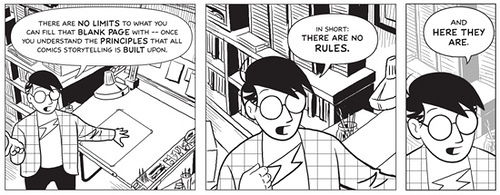
In addition to being an esteemed OLL board member, our own Elizabeth Gregg is also a graphic novelist—not only during Script Frenzy, but throughout the rest of the year. She's currently scripting a full-length epic about 600-year-old assassins, which she hopes to finish in the near future. We asked Elizabeth for her favorite comic writing resources for beginners.
The first and most important piece of advice I have is: Read scripts. Read as many of them as you can get your hands on. The reason this is important is that, unlike a film script that tends to be very regimented structurally, comic scripts vary widely depending on the writer, the artist, and the publisher. You can use your favorite search engine to find specific scripts, but The Comic Book Script Archive is also a good resource to get you started.
Here are some other resources I've found helpful over the past two years I've been working on my comic. A lot of these discoveries have been the result of flailing about, just hoping to find ideas to help me unlock both the structure and freedoms of the comic form. I do not pretend to be an expert, just an enthusiastic amateur.[[MORE]]
Books
Scott McCloud – Understanding Comics, Making Comics, and Reinventing Comics: The books in this series do talk about storytelling, but focus a lot on the graphic aspects (which makes sense since he is also an impressive artist). I am not an artist, so I've used this as a means to ensure that I actually think about what can and cannot be conveyed in a static panel.
Mark Salisbury – Writers on Comic Scriptwriting: Part of the "Writers On" series, published in 1999. Features a whole scad of comic and graphic-novel authors including Warren Ellis, Garth Ennis, Frank Miller, Grant Morrison, and Neil Gaiman talking about their process in a Q&A format. This is a good resource for figuring out how these talented writers "translate" what's in their head to the page so an artist can then realize the vision.
Dennis O'Neil – The DC Comics Guide to Writing Comics: A good overview of "how" to write comics, which includes comparisons of scripts and the finished pages. Also explores some of the why behind why the comic form is a good form for storytelling. As the title says, focuses more on the writing vs. illustrating aspect of comics.
Websites
Making Comics: This site has great 101s, discussions with writers, and tutorials for the beginning writer and artist.
Superhero Nation: Another great resource with an emphasis on writing/creating within the superhero genre (though really, the tips and tutorials offered are universal). This site also offers review forums where the brave-hearted can post their work for public critiques.
Software (that I have tried):
Celtx: While Celtx is an amazing free and dynamic program for writing film and theater, their comics resources are fairly under-developed. I used Celtx exclusively for a time, but have now been converted to Scrivener. This is still a good place to start if you don't want to pay for software.
Final Draft: Ultimately, this may be what your comic script (or any other script) gets polished in (it's industry standard), but it doesn't have all the nooks and crannies to stick your research and notes. Discounts are available for Script Frenzy participants with a percentage of the purchase price being donated to Script Frenzy.
Scrivener: So far this is the best software I have discovered for my process (which involves keeping track of a lot of notes, images, and random brain babies). This is a paid product but a discount is available for Script Frenzy participants. An additional benefit of Scrivener is that when you are ready to get all fancy with it, you are able to export to Final Draft.
Image from Scott McCloud's Understanding Comics
March 16, 2012
Bistr-OLL

Do you eat lunch at your desk? Unfortunately, I do. Or, I should say, did. I used to keep working right on through lunch, thus forgoing the 30 minutes of rest from eye-strain and brain-hurt-y thinking that's so necessary for digestion and sanity. Eating at my desk was a bad habit only partially born of not having a better place to eat. Let me explain:[[MORE]]
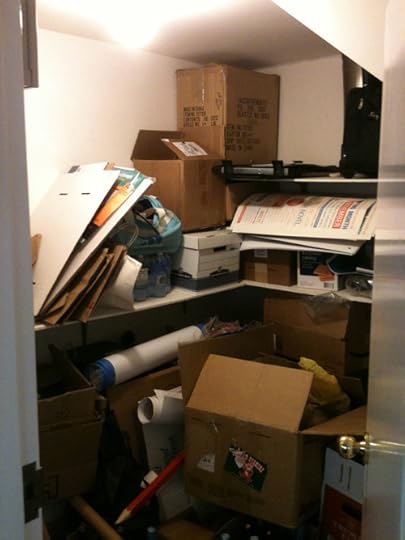
We have a conference room, but it's the only closed-door room in the whole office (other than the storage closet… or the bathroom), so meetings and phone calls take precedence over chewing and swallowing.
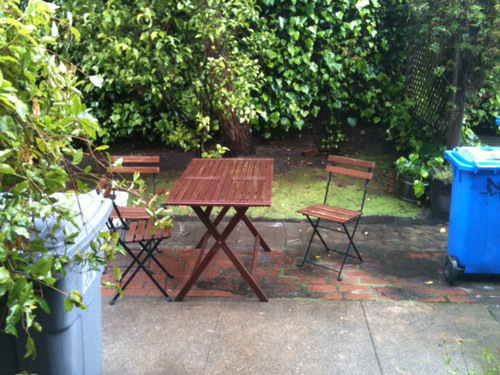
We also have an outdoor seating area by the garbage and recycle bins that is lovely on a warm, sunny day (unlike the one pictured. Wet to quite wet!). Lately our chairs have been migrating into our next door neighbors' office. Like… all of them. And we don't know why.

I've eaten in our window wells at one of the student desks displayed there. But passersby have a totally reasonable inclination to look in the windows as they stroll—surely it has nothing to do with the man doll and stuffed llama. But an audience at lunchtime is a little unnerving to me. Like a command eating performance.
So I did a little hunting around on Craigslist and found a charming little table for a bargain price, and brought it in to occupy the kitchen space otherwise filled with our water jugs.
Voila! A lunch nook is born.

Gone are the excuses; no more email-checking and mindless interwebs searching while I eat. All we need now are a few chairs and a little bit of decorating…
How do you lunch at work? And what should we hang on the walls of our office cafe corner?
March 15, 2012
Exploring the Script Frenzy Cameo Archive
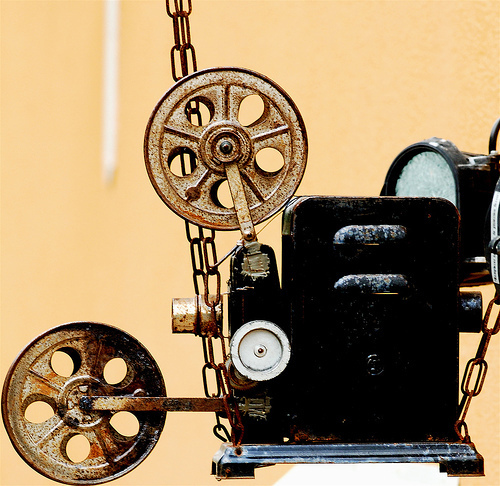
I just finished pulling out some highlights from the Script Frenzy cameo archive and I must say, it got me pretty excited to start working on my script. When Tim, the OLL office captain, asked me to go through the cameo archive and make a list of tweetable one-liners, I thought reading all that advice at once was going to give me an anxiety attack, but it was surprisingly comforting.
I noticed that almost all the contributing scriptwriters had some form of the same advice: "Just sit down and write. You'll probably hate your first draft but that's what first drafts are for." Knowing that I'm not the only one that's continually dissatisfied with my first drafts is a huge relief. And it's especially nice to hear when it's coming from accomplished screenwriters, playwrights, and graphic novelists. Frustrations with first drafts seem to be a common complaint across experience levels, and keeping that in mind makes the idea of embarking on a first draft a little less fearsome.[[MORE]]
While a lot of the advice I came across was practical and useful, like how to create realistic characters, write dialogue, structure a plot etc., it was the advice about imagining the fun extras that got me most eager to start writing. In many cameos, writers suggested designing the movie poster, creating a soundtrack, or casting characters with real actors. They argued that this is a great way to get excited about your project and visualize the finished product. As a newbie, I know I don't really have any authority to agree or disagree but it sounds like great advice to me. I think imagining a close up of Bill Murray's face on a billboard for my movie is just the boost I need to get working.
What's gets you excited about writing? Do you tackle the big picture first or do you get carried away with the smaller fun stuff?
- Jessie
Photo by Flickr user pedrosimoes7
Chris Baty's Blog
- Chris Baty's profile
- 63 followers



